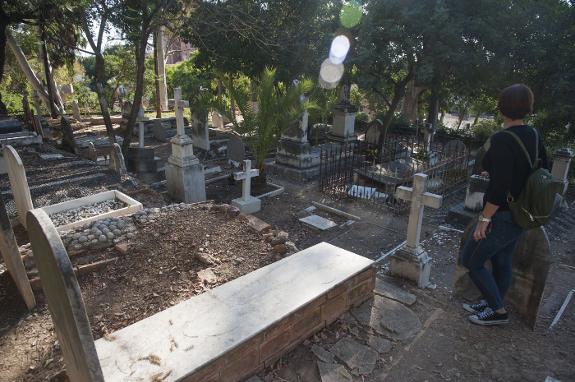

Sections
Highlight

ANA PÉREZ-BRYAN
Friday, 5 February 2021, 12:55
Compartir
Its terraces, botanical nooks and crannies and funerary monuments reflect the past two centuries of the history of Malaga, through the people who gave life to the city and found eternal rest there. From its first 'resident', liberal soldier Robert Boyd, who joined Torrijos in the cause against the absolutism of Fernando VII, to British doctor and parliamentarian José Guillermo Noble - who set up the nearby Hospital Noble - and the German crew of the frigate Gneisenau, which sank off the coast of Malaga in December 1900; to Jorge Guillén, Gerald Brenan, Gamel Woolsey and, more recently, playwright Miguel Romero Esteo, the history of the English Cemetery has, in recent years, mirrored the difficult balance involved in maintaining an active programme of events and keeping memory alive. Until now.
That's because what the historical difficulties of finance and conservation, despite being classified as a Site of Cultural Interest (BIC) in 2012, failed to do, coronavirus has succeeded in doing.
From 1 February, the crisis caused by the pandemic has forced the cemetery to close its doors from Mondays to Fridays due to a lack of funds. The situation has become unsustainable and not even the willingness of volunteers and managers has been able to prevent the first Anglican cemetery to exist in mainland Spain (it dates back to 1831) closing five days a week.
"The situation is desperate," says the vice-president of the Foundation of the English Cemetery of Malaga, Jaime Aguilera. The accounts don't add up so a decision had to be taken, although they hope it will only be temporary. "Despite everything, we really want to be optimistic and see an opportunity in this crisis, but the pandemic has affected us greatly," adds Aguilera.
The reasons the cemetery is now closed on weekdays are varied. Essentially, its funds came from regular visits from schools and groups of foreign visitors and Spanish tourists. "With the restrictions, all those have disappeared and we have had to cut down on costs as much as possible," he explains.
The cemetery needs about 2,500 euros a month to cover basic maintenance and a few staff, but the foundation has not been able to stretch the budget any further because of the drop in income from these visits: "A short while ago we cancelled the contract for the gardener, and we have had to replace the person who normally guided the tours at weekends with volunteers," says Aguilera, regretfully.
The foundation's resources mainly come from private donations which total about 30,000 euros a year. "We don't receive any financial assistance from public institutions. Sometimes, when there have been extraordinary expenses because of work that has to be carried out, Malaga council has given us a grant to cover some of the cost, but we receive no funding as such," he explains. The last time they received a grant from city hall was to repair the terraces in one part of the cemetry and habilitate the vertical garden, where the niches containing people's ashes are located.
In these difficult circumstances, the gates of this cemetery in Avenida de Priés, which is one of the four historical cemeteries in the province together with San Miguel (in Malaga), Casabermeja and Sayalonga, will only be open on Saturdays and Sundays from 10.30am to 3pm.
To try to ensure that this reduction in activity is as short as possible, members of the foundation have asked for meetings with political parties and applied for help from public and private institutions in Malaga city. Meanwhile, they hope people will visit their website (cementerioinglesmalaga.org) and sign up as volunteers, friends of the foundation (there is a minimum fee of 20 euros a year) or make a donation.
Jaime Aguilera also points out that as well as its history, the English Cemetery maintains the essence for which it was created and they hope this will provide a more fluid form of income: people may deposit the ashes of their loved ones in its niches after cremation, "at economic prices". Although burials have not been permitted at the cemetery for many years, this is another option to share eternal rest with the protagonists of history. And that is something that you don't come across every day.
Reporta un error en esta noticia
Necesitas ser suscriptor para poder votar.